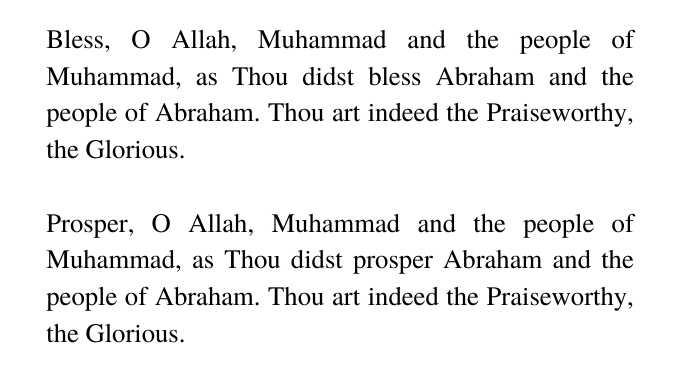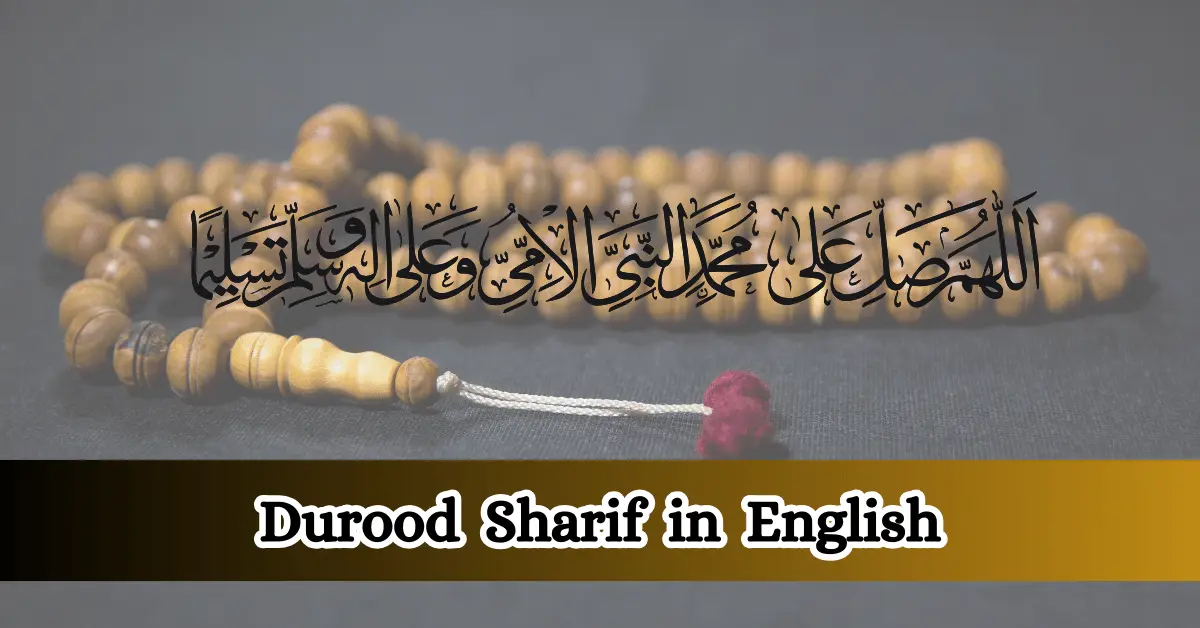Let’s See Durood Sharif in English Because Durood is a unique duty, an exceptional act of worship, a great prayer and an accepted act. It brings one closer to Allah and is the best way to get closer to the Holy Prophet.
“Indeed, Allaah and all His angels send blessings on the Prophet. O you who believe! Send blessings on them and send greetings of peace” (Al-Aḥzāb,33: 56)
Introduction
Allah Almighty initiated the blessings and peace of Allah Himself and then included the angels in this unique work. Praise be to Allah and His Malaika on Hazrat Muhammad (PBUH).
This honour of yours is eternal and not specific to any one time because it is a divine Sunnah and is perpetuated in the divine Sunnah. Although the rules issued by Allah keep changing, the Sunnah of Allah does not change. The Qur’an al-Hakim has stated this fact in this way.
“so you will not find any change in Allah’s Sunna. Nor will you find any divergence (and digression) in Allah’s Sunna” (Fāṭir,35: 43)
Durood is a beloved and popular act, and there is no doubt that it is accepted. Even if a wicked, sinful person reads it, his prayer is accepted.
Durood Sharif in English Transliteration

Hazrat Muhammad (PBUH) said: O Abu Barida! When you sit in your prayer, never forsake tashahhud and send blessings on me Allahuma Salli Ala Muhammadin and Allahumma Barik Ala Muhammadin. That is zakat on worship. And Durood upon all the prophets and Hazrat Muhammad (PBUH), and upon His righteous servants.
Hazrat Abu Masood Ansari says that whatever prayer I offer, if I do not send blessings on Hazrat Muhammad (PBUH)in it, then I think it is defective.
Durood Sharif Translation in English

“O Allah, bless Muhammad (PBUH) and the family of Muhammad (PBUH), as you prayed to Ibrahim and the family of Ibraheem that you are Hammed and glorious.”
“Oh Allah, bestow favours upon Muhammad (PBUH) and the family of Muhammad(PBUH), as You bestowed favours Ibrahim and the family of Ibrahim, that you are Hammed and Glorious.”
Best Durood Sharif

“O Allah, bless our Master and our lord Muhammad, and upon his family and companions, and bless and grant them peace.”
Hazrat Muhammad (PBUH) heard a man praying during prayers in such a way that he did not send blessings on Hazrat Muhammad (PBUH) in his supplication. The Prophet (peace and blessings of Allaah be upon him) said he hurried, and then Hazrat Muhammad (PBUH) called him to him and said to him or to someone other than him.
When one of you prays, he should first mention the greatness of Allah, then send blessings on Hazrat Muhammad (PBUH), and after that, whoever wants to pray will have his prayer accepted.
The Importance of Durood
- Hazrat Muhammad (PBUH) said: The person who recites Durood on the Prophet only once is covered by the ten blessings of Allah.
- Similarly, the Holy Prophet (PBUH) said: Whoever sends blessings upon me once, Allah sends down ten blessings upon him, his ten sins are forgiven, and his ten degrees are raised.
- Umar ibn al-Khattab said: Surely the du’aa ‘remains between the heavens and the earth, and when you recite blessings on your noble Prophet, then the du’aa’ is accepted.
- Hazrat Abdul Rahman bin Awf that five or four of the Companions of Hazrat Muhammad (PBUH) went to him all the time to fulfill the needs of the Hazrat Muhammad (PBUH).
- The narrator narrates that I was present and saw that Hazrat Muhammad (PBUH) had left the house a short while ago. I followed the Hazrat Muhammad (PBUH). He entered one of the gardens, answered prayers and made a prolonged prostration.
- (Seeing this situation) I feared that he had seized the Holy Spirit of the Hazrat Muhammad (PBUH). Hazrat Muhammad (PBUH) raised his head in prostration. Hazrat Muhammad (PBUH) asked me, ‘How do you feel? ‘I said I thought that perhaps Allah had captured the soul of Hazrat Muhammad (PBUH) forever.
- Hazrat Muhammad (PBUH) said: This is the prostration that I have performed as a token of gratitude to Allaah for the blessings He has bestowed upon me concerning my ummah. That for one who sends blessings on me once, ten good deeds are written, and ten sins are erased.
Benefits of Durood Sharif
- Allah Almighty Himself recites blessings on the Holy Prophet.
- Angels also recite blessings on the Holy Prophet at all times.
- Whoever recites Durood on the Holy Prophet, may Allah bless him.
- The one who recites Durood and Salam becomes closer to Allah.
- And becomes the beloved of the Holy Prophet.
- The Holy Prophet himself answers the one who recites Durood and Salam.
- The one who recites Durood and Salam gets the mercy of Allah.
- The sins of the one who recites Durood are forgiven.
- Dua is accepted quickly.
- Purify a person.
Can you read Durood Sharif while on periods?
In Islam, there is no specific prohibition against reciting Durood Sharif (invocation of blessings upon the Prophet Muhammad) or other forms of supplications during menstruation (periods). Women in their menstrual periods are exempt from performing certain ritual acts, such as performing formal prayers (Salah) and fasting. Still, there is no restriction on making du’a (supplications) or engaging in other acts of worship.
Women are encouraged to maintain a connection with Allah through supplications, remembrance, and other non-ritualistic acts of worship during their menstrual periods. Reciting Durood Sharif, reading the Quran, and engaging in acts of dhikr (remembrance of Allah) are generally permissible during this time.
It’s important to note that the rules and practices regarding menstruation in Islam pertain primarily to formal acts of worship, and women are not restricted from engaging in other aspects of their spiritual life during this period. If a woman chooses to recite Durood Sharif or engage in any other form of supplication during her menstrual period, it is considered permissible in Islam.
How many times should I recite Durood Sharif?
There isn’t a specific or fixed number of times that you must recite Durood Sharif (invocation of blessings upon the Prophet Muhammad) in Islam. The recitation of Durood Sharif is a virtuous act, and it is encouraged for Muslims to do so regularly as an expression of love and reverence for the Prophet.
Here are some general guidelines regarding the recitation of Durood Sharif:
- Frequent Remembrance:
- Muslims are encouraged to send blessings upon the Prophet Muhammad regularly as part of their daily routine.
- After the Adhan (Call to Prayer):
- It is recommended to recite Durood Sharif after hearing the Adhan (call to prayer).
- On Fridays:
- Muslims are encouraged to increase the recitation of Durood Sharif on Fridays, which is a blessed day in Islam.
- During Special Occasions:
- It is expected to recite Durood Sharif during special occasions, celebrations, and religious gatherings.
- Out of Love and Devotion:
- There is no specific limit on how many times you can recite Durood Sharif. You can recite it as much as you like out of love and devotion to the Prophet.
- Personal Intentions:
- You can recite Durood Sharif with any specific intention or supplication you may have, as it is believed to be a means of seeking blessings and closeness to Allah.
Remember that the essence of reciting Durood Sharif is the sincerity and love with which it is done. Whether you recite it a few times or many times, the intention and devotion behind the recitation are what matter most. It is a beautiful practice that connects the believer to the Prophet and brings blessings into one’s life.
Conclusion
Whenever the name of Hazrat Muhammad (PBUH) is called, Durood upon you. It is not necessary to recite Durood Ibrahimi only. Any easy and favourite greetings can be recited.
We must make Durood and Salam in our lives because Allah can reject all other deeds but Durood and Salam is an act that is definitely accepted.
